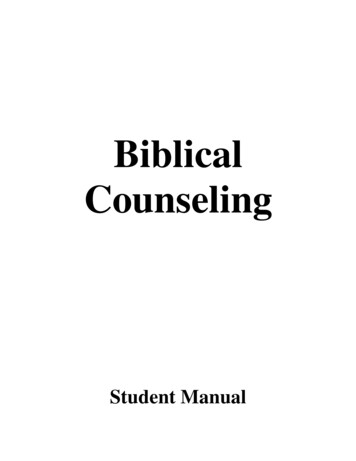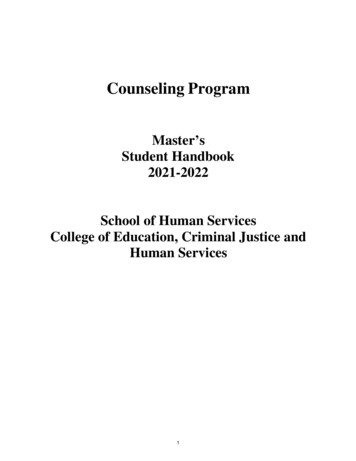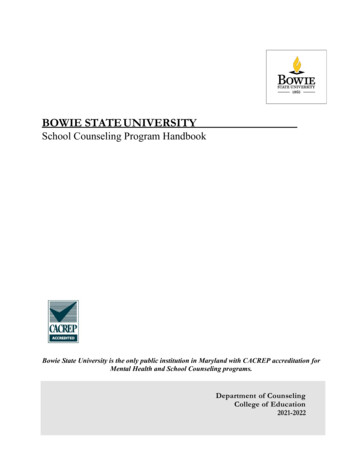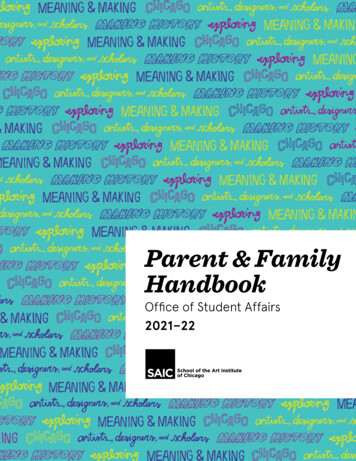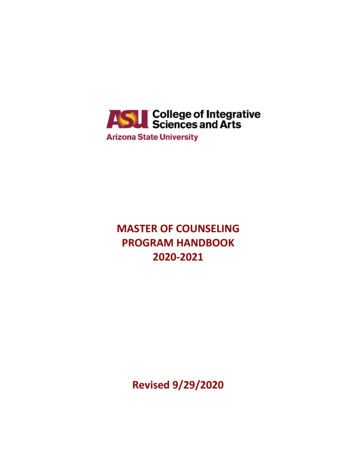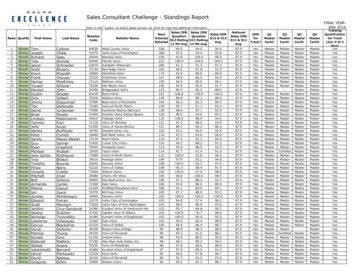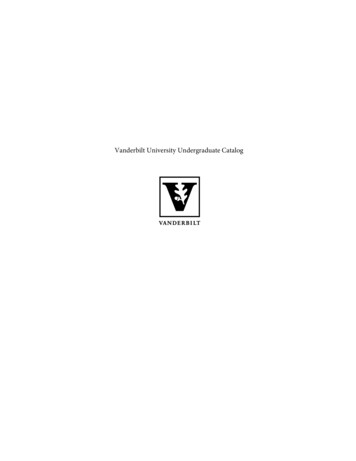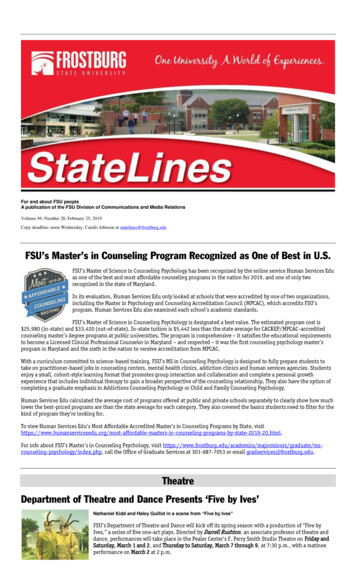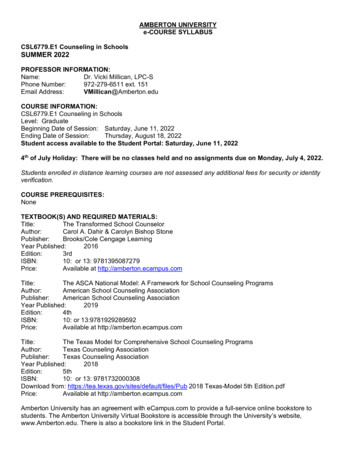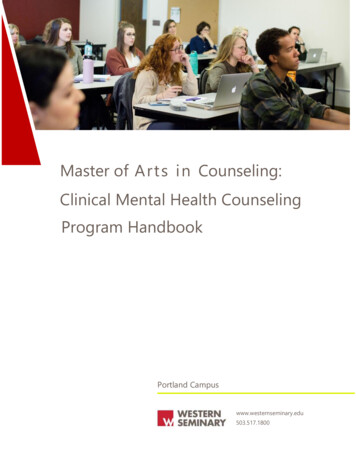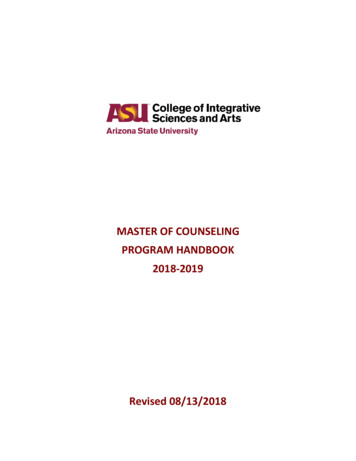
Transcription
MASTER OF COUNSELINGPROGRAM HANDBOOK2018-2019Revised 08/13/2018
LETTER FROM THE FACULTY HEADDear Potential or Current Master of Counseling Student,Thank you for your interest in the Master of Counseling (MC) program in clinical mental healthcounseling at Arizona State University. Our clinical mental health counseling program, which isaccredited by the Council for Accreditation of Counseling and Related Educational Programs(CACREP), prepares counselors for practice in mental health, education, and social servicesettings. Upon graduating and passing the National Counselor Examination, graduates areeligible to become Licensed Associate Counselors (LACs) in Arizona. After completing twoyears (3200 hours) of supervised clinical work, LACs are eligible to become LicensedProfessional Counselors (LPCs) in Arizona.Each year, we select a class of approximately 45-55 students. We seek students with academicexcellence, relevant work and life experiences, and superior letters of recommendation. Ideally,an applicant would have an undergraduate GPA of at least 3.5, GRE test scores in the 90thpercentile or above, and at least one year of work or volunteer experience in a helping setting.We review applicants holistically, so a weakness in one area (e.g., low GRE scores) could beoffset by other strengths. Importantly, we value multicultural knowledge, awareness, and skills.For more detail, please review the Program Admission section of this document.We hold group information sessions during the fall semester. We will post dates and timeson our website after September 15. Please join us to learn more about the MC program.If you are an incoming or current student, the pages that follow outline everything you needto know about the MC program. Please do not hesitate to reach out to your faculty advisor,our program coordinator, or me with any questions.Sincerely,Lisa B. Spanierman, PhDProfessor and Faculty HeadRevised 8/2018 [1]
CONTENTSMISSION STATEMENTPROGRAM OBJECTIVESTRAINING VALUES OF THE MASTER OF COUNSELING PROGRAMPROGRAM ADMISSIONCACREP VITAL STATISTICS ON STUDENTSPROGRAM REQUIREMENTSPROGRAM TRACKSCURRICULAMC COURSE SEQUENCINGCLINICAL TRAININGPROGRAM POLICIESISSUES RELEVANT TO ALL MC STUDENTSPERSONAL AND PROFESSIONAL EXPECTATIONS FOR STUDENTSACADEMIC INTEGRITYACADEMIC APPEALS POLICYEVALUATION AND DISMISSAL POLICIESCOUNSELING FACULTYMC ADMISSIONS FREQUENTLY ASKED QUESTIONS (FAQ)APPENDIX A – MC COURSE SEQUENCEAPPENDIX B – MC COURSE CHECKLISTAPPENDIX C – MC PRACTITIONER TRACK ELECTIVESAPPENDIX D – MC PRACTITIONER TRACK PRE-APPROVED OUTSIDE ELECTIVESAPPENDIX E – COMPREHENSIVE WRITTEN EXAMINATIONAPPENDIX F – MASTER’S THESISAPPENDIX G – SAMPLE REQUIREMENTS AND EXPECTATIONS FOR MASTER’S THESISRevised 8/2018 [2]
MISSION STATEMENTThe mission of the 60-credit hour program is to prepare students to become license eligible asprofessional counselors in Arizona and other states with comparable licensure requirements.With its strong focus on multicultural counseling across the lifespan, students learn to promotethe health of individuals, families, groups, and organizations in a diverse society. The programprepares students to work with clients in a variety of mental health settings. The program alsoprepares students who wish to pursue doctoral-level studies.PROGRAM OBJECTIVESThe MC program objectives reflect current knowledge and projected needs concerningcounseling practice in a multicultural and pluralistic society. Graduates of the program willdemonstrate:1.2.3.4.5.6.7.Knowledge and application of professional counseling ethicsKnowledge and application of multicultural counseling and social justice competenciesKnowledge of human growth and development and how it impacts counselingKnowledge of career development and ability to design interventionsKnowledge and skill in establishing counseling relationships and employing intervention modelsKnowledge and skill in group process and ability to intervene using groupsKnowledge of issues relevant to assessment selection and evaluation, and skill in the appropriateuse of assessment instruments8. Knowledge and application of basic research designs, statistics, and program evaluation9. Professional values and dispositions consistent with the American Counseling Association10. Knowledge of professional and clinical mental health counselor identityThe faculty designed the MC program in clinical mental health counseling according to thestandards set forth by the Council for the Accreditation of Counseling and Related EducationalPrograms (CACREP). The MC program was first accredited by CACREP as a communitycounseling program in 1995. Under the 2009 CACREP Standards that phased out all communitycounseling programs, the MC program was reaccredited in 2010 as a clinical mental healthcounseling program. Our program aligns with the 2016 CACREP Standards, and we havemaintained continuous accreditation since 1995.The MC program is committed to the scientist practitioner model. One manifestation of thatcommitment is the three complementary functions of the program’s Counselor Training Center:service delivery, clinical training, and research.Revised 8/2018 [3]
The MC program at Arizona State University is committed to creating an educationalenvironment that reflects the following: A learning community that is respectful of human rights and cultural differences.A curriculum that addresses the complexity of a multicultural society and issues ofdiversity as represented by the populations that counselors serve.A curriculum that reflects expertise and competencies, credentialing, and communityneeds for culturally competent counselors.Opportunities for students to apply their counseling skills in a structured,supervised learning environment.A comprehensive program that is open to revision based upon the changingneeds of students, faculty, the institution, professional counseling associations,and society.A curriculum and learning opportunities that reflect current professionalcounseling standards.The State of Arizona has licensure requirements for master’s level counselors. Check with theBoard of Behavioral Health Examiners for complete information.The faculty has endorsed the following American Counseling Association (ACA) competencies:ALGBTIC Competencies for Counseling LGBQIQA Individuals (2012), Competencies for Counselingthe Multiracial Population (2015), Multicultural and Social Justice Counseling Competencies(2015), Competencies for Addressing Spiritual and Religious Issues in Counseling (2009), andMulticultural Career Counseling Competencies (2009).TRAINING VALUES OF THE MASTER OF COUNSELING PROGRAMThe MC Program at Arizona State University subscribes, and expects all students to subscribe,to the ACA (2014) Code of Ethics. These standards apply to all aspects of professional behavior,including (but not limited to) the practice of counseling, supervision, teaching, research,consultation, and collegial relations. In addition, the program is committed to creating andmaintaining a positive training climate that (a) allows for open inquiry, free expression, andeffective conflict resolution, and (b) promotes the understanding and affirmation of all aspectsof human diversity. The specific implications of this position are elaborated as follows:1. Freedom of expression is protected and encouraged. Students are expected to expressthemselves in a professionally responsible manner that demonstrates respect for others.Certainly, people may differ regarding whether particular communications are respectful.Revised 8/2018 [4]
Students are urged to work through such difficult situations by maintaining an open mind,respect and empathy for others, and a commitment to continuing the dialogue. Whennecessary, faculty may play a facilitative role in these difficult dialogues. Unprotected formsof expression—threats, verbal abuse, and harassment—are not tolerated and will beconsidered grounds for disciplinary action within the program. There are no acceptableexcuses for such behavior; therefore, students are cautioned about what they may say as a“joke” or “in the heat of the moment.”2. An essential part of training is understanding and appreciating all aspects of humandiversity, including sexual orientation, gender, race, ethnicity, culture, language, religion,spirituality, socioeconomic status, ability, and age. Students are expected to use theirtraining to free themselves, as much as possible, from prejudice related to any of theseaspects of diversity. Again, people may differ regarding what constitutes prejudice, andstudents are encouraged to work through these issues in the manner described in Point 1above.3. Throughout their training, students should expect to work with colleagues and clients whoare different from themselves. Learning to work with different kinds of people is a centralgoal of professional training. Students who have difficulty in working with particular kinds ofclients must address and resolve these difficulties in supervision.PROGRAM ADMISSIONAdmission to the MC program is based on the applicant’s potential for graduate study, previouspreparation and experience, and the possession of personal qualities that contribute to successas a counselor. To balance student demand with available resources, the program is limited inthe number of students admitted each year. Factors that are evaluated in the admissionprocess include:1.2.3.4.Academic potential.Professional and volunteer experiences in helping-related fields.Personal statement.Recommendations from persons able to address areas 1 and 2 above.ACADEMIC POTENTIALCounseling faculty take into consideration a number of factors when reviewing applications.These include: the FRK index (see below), personal statement, transcripts, GRE scores, andletters of recommendation.Revised 8/2018 [5]
To calculate FRK index, please use the following formula:FRK index Undergraduate GPA (or Jr/Sr GPA) ((GREverbal GREquant)/400)The GRE score in this formula is the “old” GRE score ranging from 200-800. The “new” GREranges from 130-170. You must convert the new GRE to the old GRE and plug it into the aboveequation using the ETS conversion table.The faculty give preference to applicants with a minimum FRK index of 5.5. For example, astudent might obtain a 5.5 FRK index with a 3.0 undergraduate GPA and GRE scores of 500 inboth the verbal and quantitative areas. The FRK index formula permits higher GRE scores tocompensate for lower GPA and vice-versa.Recruitment activities and admissions recommendations are program-based. Under exceptionalcircumstances, students whose FRK index falls below 5.5 may still be considered where there isother strong evidence of the student’s academic potential. All students must be graduates ofaccredited higher education institutions.PERSONAL STATEMENTApplicants are required to submit a 2 to 3 page personal statement (12pt.Times New Romanfont with 1” margin, double-spaced) that indicates their qualifications (e.g., professionalexperiences and personal attributes) and interest in ASU’s MC program.Specifically, applicants are asked to describe how their education and training, as well asvolunteer and professional experiences, inform why they want to pursue the MC degree.They also should outline how our program will help them meet their future career goals.Applicants are expected to discuss their ability to work with and be sensitive to the needs of amulticultural and diverse society, including (but not limited to), members of diverse racial andethnic groups and sexual minority individuals.RECOMMENDATIONSAt least two (2) and at most three (3) recommendation letters are required. These should befrom persons able to evaluate the applicant’s academic potential (e.g., a previous academicinstructor) and/or professional experience (e.g., a supervisor in a job). As part of the onlineapplication, applicants are asked to provide the names and email addresses for each of theirrecommenders so that ASU can contact them directly to solicit letters. Applicants arediscouraged from asking for recommendations from individuals or acquaintances who have notoverseen their professional or academic work.Revised 8/2018 [6]
You will be asked if you do or do not waive your right to review the recommendation sent onyour behalf. Each recommender will be informed of your decision and asked to send theirrecommendation electronically to ASU. Do not email, mail or fax materials.THE APPLICATION PROCESSTo apply to the program, applicants must submit the online Graduate Application and thesupplemental materials required by the MC program as directed in this section. Inquiries maybe sent to ccp@asu.edu.Graduate Admission Application. The graduate admission application is submitted online atGraduate College. The online application portal is available starting September 1. It is theapplicant’s responsibility to review the application information and note requirements thatcould delay processing the application, including ensuring the applicant is applying for theappropriate semester for which applications are being accepted. Applicants are responsible forensuring that their files are complete.Supplemental Materials Required by the MC Program. Personal statement as described above—upload as part of the graduate admissiononline application. At least two and a maximum of three completed recommendations, submitted directlyfrom letter writers (see above). GRE Score Report—sent separately to ASU Graduate College. Use University Code4007 for submitting GRE. If a department code is requested, use 0000. Official Transcripts—sent separately to ASU Graduate College. Electronic submission oftranscripts by an applicant is not accepted. Official transcripts must be forwarded toASU by the reporting undergraduate institution. Reporting institutions may send officialtranscripts electronically via transcript clearinghouse or mail to Graduate CollegeTimeline. The Graduate Application and all materials required by the MC program must bereceived prior to the annual deadline of the first business day after January 1 for considerationof entry in the subsequent fall. Applications are considered once a year for the fall semesteronly, there is no spring admission.Please allow ample time prior to the deadline for administrative processing (6 weeksrecommended). Responsibility for meeting the deadline is solely that of the applicant.Incomplete files will not be considered. It is the applicant’s responsibility to ensure that thefile is complete.Revised 8/2018 [7]
The MC program reviews all applications and accepts students based on qualifications. Theadmissions committee will need approximately 8 weeks (after January 1) to review thecompleted files. The committee’s recommendations will then be forwarded to GraduateCollege for a decision. Applicants will be notified in their MyASU (i.e., student communicationportal) by Graduate College concerning admission to the program. The program staff cannotrelease information regarding admission decisions.Deferral Policy. Admitted students may defer their admission to the following fall term. Onedeferral is permitted per Graduate College policy. Deferrals must be requested officially viaMyASU no later than the first day of classes. Students will be required to reapply for admissionif deferral is not requested by this deadline.Affirmative Action. In all admissions, the MC program, the College of Integrative Sciences andArts, and the University are committed to Affirmative Action policy.Advisor Assignments. Upon accepting our offer of admission, students will receive informationrelated to their faculty advisor, program orientation, and guidelines for navigating the programeffectively.CACREP VITAL STATISTICS ON STUDENTSInformation on 2017-2018 CACREP Vital Statistics will be available on our webpage.GENERAL PROGRAM INFORMATIONIf your decision to apply for the program is based on specific course requirements, pleaseensure that you have the latest program description before you accept an offer of admissionand enroll in classes. The program faculty reserves the right to make modifications to theprogram, curricula, and evaluation methods to best address student, faculty, program,university, accreditation, and/or community needs.PROGRAM REQUIREMENTSThe following are policies of the MC program, the College of Integrative Sciences and Arts,and/or ASU Graduate College regarding the MC degree:1. A minimum of 60 graduate credit hours approved by the faculty advisor, faculty head, andGraduate College is required for graduation.2. The information in this section relates to a student’s interactive Plan of Study (iPOS). TheiPOS specifies the requirements that students must complete for their degree and issubmitted and revised electronically. To facilitate degree completion, graduate studentsmust submit their iPOS by the time they have enrolled in 30 of the 60 credit hoursRevised 8/2018 [10]
required to complete the MC degree. Failure to have an approved iPOS will place a holdon your student account. You will not be able to enroll into courses. The iPOS becomes acontract between the University and the student that guides the student in completingdegree requirements.a. All work toward the MC degree must be completed within six consecutive years,beginning with the semester and year of admission to the program. Graduate coursestaken prior to admission that are included on the iPOS must have been completed withthree years of the semester and year of admission to the program.b. Students complete the iPOS online via their MyASU link. However, the iPOS mustbe formally approved by the advisor and faculty head. This approval requires thatthe student print the iPOS approval page and get signatures from these twoindividuals before the iPOS can be submitted and approved electronically. Studentsshould print out the iPOS approval page along with a completed MC CourseworkChecklist and submit both together to their advisor and then the faculty head forsignatures. The program coordinator will notify the student when to submit theiPOS electronically.c. Once a student’s official iPOS has been approved, course changes and changes in thecommittee are submitted electronically via the iPOS. Any changes must be approvedby the advisor, the faculty head, and Graduate College.d. Students must have an approved iPOS and a three-person committee, with advisor aschair, prior to scheduling their comprehensive examination or thesis defense.e. A student must obtain satisfactory clinical evaluations in pre-practicum,practicum, and internship and earn passing grades (“Y”) in all.f. A student must achieve a grade point average (GPA) of “B” (3.0) or better on all threeGPAs (iPOS GPA, Overall Graduate GPA, and Cumulative GPA) to maintain satisfactoryacademic progress and graduate. If a 3.0 GPA is not maintained, the student will beplaced on academic probation. The student must work with her/his advisor to makemeaningful progress toward meeting University and program requirements. Please seeGraduate College Policy and Procedures for greater detail.g. Per program policy, “B-” is the minimum grade permitted on a student’s iPOS. If astudent earns less than a B- in any course, then they must retake the course orits equivalent.3. ASU Graduate College and the College of Integrative Sciences and Arts have establishedpolicies for the acceptance of equivalent graduate courses completed prior to admission tothe MC program. The following policies are adhered to consistently:a. A maximum of twelve (12) semester hours of counseling-relevant graduate level coursestaken prior to the semester of admittance may be applied to the MC degree.b. Only courses in which the student has received a grade of “B” or better are acceptedfor credit in meeting equivalent course requirements.c. The MC program only considers transfer credits from CACREP-accredited programs.Revised 8/2018 [10]
4. Students who have taken graduate coursework at other universities that meet the criteriaoutlined in #3 above, may petition the faculty to waive the ASU requirement in favor of theprevious coursework. A separate petition must be filed for each course. A petition consistsof a cover sheet, the Petition for Course Substitution, the syllabus of the previously takencourse, and any other materials (e.g., bibliographies and exams) that speak to the nature ofthe course. The student presents the petition to the advisor, who makes a determination ofcourse equivalence. If the advisor approves, the petition is forwarded to the instructor(s) ofthe relevant course(s). If the petition is approved, the faculty head signs the form, gives acopy to the student, and places a copy in the student’s file. The student is required tosubmit these courses on their iPOS. Students should be aware that state licensure boardsmight require special justification of courses transferred from other institutions becausethese courses will not appear on ASU transcripts.PROGRAM TRACKSThe MC degree is a 60-semester-hour professional program that prepares counselors for anumber of mental health counseling settings, including colleges, universities, schools,organizational settings, healthcare settings, and community and mental health agencies. Theprogram can be completed in no less than two years. Most students complete the program in 23 years. For our students graduating in 2017-2018, approximately 69.6% completed theprogram in two years (typically including summer enrollment), and 100% completed withinthree years. The program is designed for full-time students, but the faculty makes exceptions incases with extenuating circumstances.The Practitioner Track places considerable emphasis on supervised field experiences andspecialized clinical coursework. In addition to the core courses, students complete 12 graduatecredits of clinically-relevant electives (see Appendices C and D). A comprehensive writtenexamination is required to complete this track.The Research Track places joint emphasis on developing research competencies along withsupervised field experiences. In addition to the core courses, students complete two statisticsor methods courses. Successful completion of a master’s thesis is required in this track.Although the Research Track is designed to meet the needs of students who intend to pursuedoctoral study with a research emphasis, the Practitioner Track also prepares students fordoctoral degrees in counselor education and related programs. Both prepare students forlicensure.Refer to Appendix A for course sequences for both Practitioner and Research Tracks.Revised 8/2018 [10]
CURRICULAA minimum of 60 credit hours is required to complete the program. All students are required tocomplete the Professional Core (48 credits), plus 12 credits of electives (if on Practitioner Track)or 12 credits of thesis and statistics/methods (if on Research Track). Please note, at least 2 of the4 elective courses must be taken in our own unit (CCP).THE PROFESSIONAL CORECED 522 Theories of Counseling and PsychotherapyCED 523 Psychological TestsCED 527 Prevention & ConsultationCED 529 Lifespan Human DevelopmentCED 534 Occupations and CareersCED 545 Analysis of the IndividualCED 567 Group Dynamics and CounselingCED 577 Counseling Pre-practicumCPY 645 Professional Issues and EthicsCPY 671 Multicultural CounselingCED 680 Practicum ClinicaCED 680 Practicum Seminar aCED 684 Internship bCED 501 Introduction to Research and Evaluation in CounselingCED 502 Counseling Research Data AnalysisTotal3 hrs3333333333363348 hrsStudents should be aware that self-exploration and self-knowledge are prerequisites foreffective counseling, and many courses require students to engage in self-reflection.a Counseling Practicum (CED 680) is designed to foster the development of students’counseling skills, promote professionalism, and provide an opportunity for personal growth.Faculty approval is required prior to registering for practicum. Moreover, students mustfamiliarize themselves with the procedures of the Counselor Training Center (CTC) prior tobeginning practicum and provide proof of personal liability insurance. See additionalinformation here.b Prior to registration for Internship (CED 684), students must obtain faculty approval andsubmit proof of personal liability insurance. See additional information here.Revised 8/2018 [11]
THE PRACTITIONER TRACKStudents in the Practitioner Track are required to complete the Professional Core (48 credithours) and four advisor-approved electives (12 credit hours). Refer to Appendix C for electivesoffered by the Faculty of Counseling and Counseling Psychology. Refer to Appendix D for preapproved electives offered through other academic departments.Comprehensive Written Exam. Students in the Practitioner Track must pass a standardizedcomprehensive examination in order to graduate. The MC program uses the CounselorPreparation Comprehensive Examination (CPCE). A raw score of at least 76 is required to pass.Students not passing on the first administration of this test will have only one more opportunityto pass the test. If a student fails after two administrations, the student is recommended fordismissal from the program. Refer to Appendix E for more information about thecomprehensive exam.THE RESEARCH TRACKAll students are admitted directly into the Practitioner Track. Any student subsequently seekingadmission into the Research Track should follow these steps:1. The student consults with their faculty contact during summer prior to enrollment.The faculty contact will guide the student in how to identify a thesis advisor/chair.2. The student follows the suggested course sequence for the Research Track.3. The student establishes an agreement with a faculty member willing to serve as thesisadvisor/chair who helps to develop the initial research idea into a research proposal.The thesis advisor/chair must be faculty in the MC program. In rare cases where thechair is outside of the program, a program faculty member must serve as co-chair.4. The student and thesis advisor jointly inform the faculty head in writing of their contractto work together via the Committee Approval Form. This notification to the facultyhead constitutes admission into the Research Track.5. The student and thesis advisor jointly decide on the other two members of the thesiscommittee, secure their agreement to serve, and notify the faculty head via theCommittee Approval Form. Committee members may be faculty from other programs;however, at least two members must be core faculty in Counseling and CounselingPsychology.6. The student must submit the interactive iPOS as follows:a. The thesis advisor must be identified on the iPOS as Committee Chair.b. The committee members identified above must be listed as CommitteeMembers on the iPOS.c. The student must choose the Thesis option on the iPOS Degree Requirementsscreen when prompted.Revised 8/2018 [12]
7. The student completes the research proposal to the thesis advisor’s satisfaction anddefends the proposal before the thesis committee. The proposal defense must occur andthe Report of Master’s Thesis Proposal must be submitted before the thesis research can beconducted.8. In addition to the Professional Core (48 hours), Research Track students complete:EDP 552 Multiple Regression and Correlation Methods*3 hrsEDP 554 Analysis-of-Variance Methods**3CED 599 Thesis6Total12 hrs*Students should consult with their advisors regarding equivalent statistics courses (e.g.,FAS 505 Applied Regression Analysis or PSY 531 Multiple Regression).**COE 503 Introduction to Qualitative Research may be substituted if student is conductinga qualitative thesis. Other methods courses may suffice, if approved by advisor andprogram.Master’s Thesis. Students in the Research Track must complete and defend a master’s thesis inorder to graduate. Students should work closely with their thesis advisor to develop theirresearch proposal and defense. Refer to Appendix F for more information about the Master’sThesis.Students considering the Research Track should be aware that it is a major commitment of timeand energy on the part of the student and faculty. The decision to enter the research trackshould be made very carefully and in consultation with the faculty advisor. If this decision is notmade in the first semester, it is unlikely that the student can complete the Research Trackwithin two years. Refer to Appendix G for an example of thesis requirements and expectations.Research Track students, just as Practitioner Track students, are required to complete 600hours of Internship.MC COURSE SEQUENCINGThe sample course schedules in Appendix A provide three options of how one should enrollfor courses (i.e., Practitioner Track A, Practitioner Track B, or Research Track) to ensure thatcourses are taken in a sequence to optimize progress in the program. Most courses areoffered at least twice a year but some only once (see CCP Projected Course Offerings).Revised 8/2018 [13]
CLINICAL TRAININGStudents need to be aware that it is extremely difficult, if not impossible, to be employed fulltime while enrolled in practicum and/or internship. These courses require a significant timecommitment (10-12 hours per week for practicum and 20-25 hours per week for internship).Pursuant to the 2016 CACREP Standards, all students are required to obtain individualprofessional liability insurance while enrolled in practicum and internship. Because of the manyprofessional benefits of membership in the American Counseling Association (ACA), includingindividual professional liability insurance, the program requires proof of membership in ACAprior to beginning CED 680 Practicum and CED 684 Internship.Counseling practicum (CED 680). Practicum is a very important course in the training ofcounselors. It is a time when students apply theoretical content to their work with clients at theCounselor Training Center (CTC)
Council for the Accreditation of Counseling and Related Educational. Programs (CACREP). The MC program was first accredited by CACREP as a community counseling program in 1995. Under the 2009 CACREP Standards that phased out all community counseling programs, the MC program was reaccredited in 2010 as a clinical mental health counseling program.
